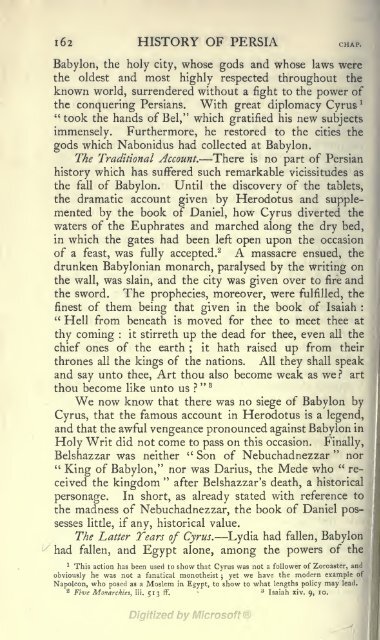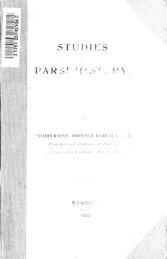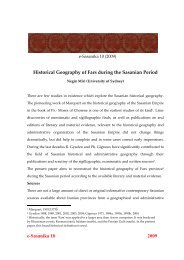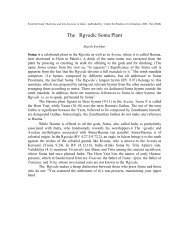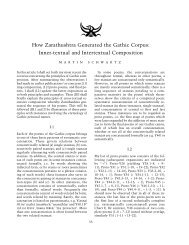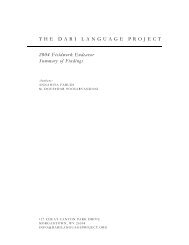- Page 1:
^'^ l*^ CD CO
- Page 7 and 8:
A HISTORY OF PERSIA
- Page 10 and 11:
^v^J-^' BAS-RELIEF OF CYRUS THE GRE
- Page 12 and 13:
x- !^ COPYRIGHT 111 v/,1
- Page 15 and 16:
Part of a Persian Hunting Scene. (F
- Page 17 and 18:
k A Sphinx. (Gold Medallion from Br
- Page 19 and 20:
CONTENTS B Kini Kingdom, 745-606 K
- Page 21 and 22:
N) CONTENTS xtii CHAPTER XIV The Pe
- Page 23 and 24:
CONTENTS XV CHAPTER XXI PACE The Ba
- Page 25 and 26:
^ CONTENTS xvii B.C.—The Battle o
- Page 27 and 28:
CONTENTS xix CHAPTER XXXV " ' PAGE
- Page 29:
CONTENTS xxi Literature—The Monar
- Page 32 and 33:
XXIV HISTORY OF PERSIA The Sleeping
- Page 34 and 35:
ii'} Nasir-u-Din Shah. MAPS Vol. I
- Page 36 and 37:
HISTORY OF PERSIA CHAP. cities, Isf
- Page 38:
HISTORY OF PERSIA CHAP. To the west
- Page 42 and 43:
6 HISTORY OF PERSIA chap. in conseq
- Page 45 and 46:
, CONFIGURATION AND CLIMATE 7 what
- Page 47 and 48:
I CONFIGURATION AND CLIMATE 9 In vi
- Page 49 and 50:
I CONFIGURATION AND CLIMATE ii Wind
- Page 51 and 52:
CONFIGURATION AND CLIMATE 13 and me
- Page 53 and 54:
I CONFIGURATION AND CLIMATE 15 The
- Page 57 and 58:
I CONFIGURATION AND CLIMATE 17 west
- Page 59 and 60:
Part of a Persian Hunting Scene. (F
- Page 61 and 62:
„ DESERTS, RIVERS, ETC. 21 off mo
- Page 63 and 64:
Afghanistan. DESERTS, RIVERS, ETC.
- Page 65:
mam^mm^wsmmmmmmw 2.V
- Page 68 and 69:
26 HISTORY OF PERSIA chap. taken th
- Page 70 and 71:
28 HISTORY OF PERSIA chap. past, th
- Page 72 and 73:
30 HISTORY OF PERSIA Hamadan, the c
- Page 75 and 76:
„ DESERTS, RIVERS, ETC. 31 donkey
- Page 77 and 78:
DESERTS, RIVERS, ETC. 33 mentions i
- Page 79:
OVIS VIGNEI ARCAL, 38 INCHES. (Shot
- Page 82 and 83:
36 HISTORY OF PERSIA chap. Of non-g
- Page 85 and 86:
„ DESERTS, RIVERS, ETC. 37 and si
- Page 87 and 88:
Headi'iece of Glazed Stoneware. (Fr
- Page 89 and 90:
Ill GEOGRAPHY OF ELAM & BABYLONIA 4
- Page 91:
u •cK,
- Page 94 and 95:
44 HISTORY OF PERSIA its source the
- Page 97 and 98:
Ill GEOGRAPHY OF ELAM & BABYLONIA 4
- Page 99 and 100:
Ill GEOGRAPHY OF ELAM & BABYLONIA 4
- Page 101:
^^..?^ S72*>:-„ «pf*'*« ve Z ^
- Page 104 and 105:
so HISTORY OF PERSIA chap. modern t
- Page 106 and 107:
52 HISTORY OF PERSIA chap, m Next p
- Page 108 and 109:
54 HISTORY OF PERSIA chap. approxim
- Page 110 and 111:
56 HISTORY OF PERSIA and absorbed t
- Page 112 and 113:
58 HISTORY OF PERSIA chap. forced t
- Page 115 and 116:
ELAM AND SUSA, THE CAPITAL 59 nativ
- Page 117:
PREHISTORIC VASE FOUND BY AUTHOR. (
- Page 120 and 121:
^ dates 62 HISTORY OF PERSIA chap.
- Page 123 and 124:
ELAM AND SUSA, THE CAPITAL 63 rapid
- Page 125 and 126:
CHAP. V ELAM, SUMER, AND AKKAD 65 c
- Page 127 and 128:
ELAM, SUMER, AND AKKAD 67 their cru
- Page 129 and 130:
ELAM, SUMER, AND AKKAD 69 also reas
- Page 131:
THE STELE OF NARAM-SIN. Photo Manse
- Page 134 and 135:
72 HISTORY OF PERSIA expression and
- Page 136 and 137:
74 HISTORY OF PERSIA chap. several
- Page 138 and 139:
Anzanite Tkxt of Shilhak-in-Shushin
- Page 140 and 141:
78 HISTORY OF PERSIA Elamite reacti
- Page 142 and 143:
ill
- Page 144 and 145:
8o HISTORY OF PERSIA CHAP. The Laws
- Page 147 and 148:
ELAM AND BABYLON 8i the Hammurabi d
- Page 149:
BOUNDARY STONE, UNFINISHED, OF THE
- Page 152 and 153:
84 HISTORY OF PERSIA chap.vi It was
- Page 154 and 155:
86 HISTORY OF PERSIA chap. by Ninev
- Page 156 and 157:
88 HISTORY OF PERSIA The greatest c
- Page 158 and 159:
90 HISTORY OF PERSIA or semi - inde
- Page 160:
92 HISTORY OF PERSIA ill return he
- Page 164 and 165:
94 HISTORY OF PERSIA The Revolution
- Page 169 and 170:
THE ASSYRIAN EMPIRE 95 by the whole
- Page 171:
9G w
- Page 174 and 175:
98 HISTORY OF PERSIA chap, vn succe
- Page 176 and 177:
loo HISTORY OF PERSIA chap. the Arj
- Page 178:
I02 HISTORY OF PERSIA original Arya
- Page 182 and 183:
I04 HISTORY OF PERSIA bronze : but
- Page 184 and 185:
^ CHAPTER Part of a Persian Hunting
- Page 186:
io8 HISTORY OF PERSIA CHAP. Persia
- Page 190 and 191:
no HISTORY OF PERSIA CHAP. a langua
- Page 192 and 193:
112 HISTORY OF PERSIA abolished, we
- Page 194 and 195:
114 HISTORY OF PERSIA to point out
- Page 196 and 197:
ii6 HISTORY OF PERSIA and that it w
- Page 199 and 200:
IX RELIGION OF MEDES & PERSIANS 117
- Page 201 and 202:
RELIGION OF MEDES & PERSIANS 119 Su
- Page 203 and 204:
CHAP. X THE RISE OF MEDIA 121 Assyr
- Page 205 and 206:
m THE RISE OF MEDIA 123 the frequen
- Page 207 and 208: X THE RISE OF MEDIA 125 route to wh
- Page 209 and 210: THE RISE OF MEDIA 127 arranged that
- Page 211 and 212: THE RISE OF MEDIA 129 their history
- Page 215 and 216: THE RISE OF MEDIA 131 shall lay hol
- Page 217 and 218: Early Lydian Coin. CHAPTER XI MEDIA
- Page 219 and 220: XI MEDIA, BABYLONIA, AND LYDIA 135
- Page 222 and 223: I il
- Page 224 and 225: 138 HISTORY OF PERSIA many games. T
- Page 226 and 227: I40 HISTORY OF PERSIA chap, xi it i
- Page 228 and 229: 142 HISTORY OF PERSIA The founder o
- Page 231 and 232: XII THE HEROIC AGE OF PERSIA 143 ha
- Page 233: '^^•f^jiJi'^ 'f-r').0*J>f'^f. 'ii
- Page 236 and 237: 146 HISTORY OF PERSIA chap. of Cyru
- Page 238 and 239: Persian King fighting Barbarians. (
- Page 240 and 241: I50 HISTORY OF PERSIA chap. ** of g
- Page 243: SttuiforcL's Geocj^Esiah^, Londaiv.
- Page 246 and 247: 152 HISTORY OF PERSIA CHAP. Anshan,
- Page 248 and 249: 154 HISTORY OF PERSIA chap. The ove
- Page 250 and 251: 156 HISTORY OF PERSIA front of his
- Page 253 and 254: THE RISE OF PERSIA 157 to the rescu
- Page 255 and 256: THE RISE OF PERSIA 159 their develo
- Page 257: XIII THE RISE OF PERSIA i6i as the
- Page 261: IGH
- Page 264 and 265: .
- Page 266 and 267: 1 68 HISTORY OF PERSIA chap. marche
- Page 269 and 270: THE PERSIAN EMPIRE 169 Egypt in 521
- Page 271 and 272: THE PERSIAN EMPIRE 171 family ; but
- Page 273: ^^^ •^Cf i I y^ tll^^^- DARIUS AN
- Page 276 and 277: 174 HISTORY OF PERSIA of silver. Ba
- Page 278 and 279: 176 HISTORY OF PERSIA whereas Rawli
- Page 280 and 281: 178 HISTORY OF PERSIA chap. of boat
- Page 282 and 283: 1 80 HISTORY OF PERSIA chap, xiv wa
- Page 284 and 285: i82 HISTORY OF PERSIA CHAP. fine, v
- Page 286 and 287: 1 84 HISTORY OF PERSIA chap. As thi
- Page 288 and 289: 1 86 HISTORY OF PERSIA dice : but,
- Page 290: 1 88 HISTORY OF PERSIA Yakut, and w
- Page 294 and 295: I90 HISTORY OF PERSIA under the Gre
- Page 297 and 298: XV THE ANCIENT PERSIANS 191 by a Gr
- Page 299: y^y
- Page 302 and 303: 194 HISTORY OF PERSIA chap. The pal
- Page 305 and 306: THE ANCIENT PERSIANS 195 opposite i
- Page 307: BRONZE VESSELS FROM KHINAMAN. ifG
- Page 311 and 312:
THE ANCIENT PERSIANS 197 but she di
- Page 313 and 314:
CHAP. XVI PERSIA AND HELLAS 199 ear
- Page 315 and 316:
?cvi PERSIA AND HELLAS 201 Naxos ha
- Page 317:
~f *C^ W *i0i ^^^'- r-Q Mi:^£^^. ^
- Page 320 and 321:
204 HISTORY OF PERSIA chap. Attica
- Page 322 and 323:
^\; 206 HISTORY OF PERSIA chap. or
- Page 325 and 326:
PERSIA AND HELLAS 207 frhumane ; an
- Page 327 and 328:
CH. XVII REPULSE OF PERSIA BY HELLA
- Page 329 and 330:
XVII REPULSE OF PERSIA BY HELLAS 21
- Page 331 and 332:
XVII REPULSE OF PERSIA BY HELLAS 21
- Page 333 and 334:
XVII REPULSE OF PERSIA BY HELLAS 21
- Page 335 and 336:
XVII REPULSE OF PERSIA BY HELLAS 21
- Page 337 and 338:
XVII REPULSE OF PERSIA BY HELLAS 21
- Page 339 and 340:
REPULSE OF PERSIA BY HELLAS 221 whe
- Page 341:
FALLEN PERSIAN STANDARD-BEARER. (Lo
- Page 344 and 345:
224 HISTORY OF PERSIA capture of Se
- Page 346 and 347:
^ ACHAEMENIAN EaGLE. (From Gold Med
- Page 348 and 349:
22 8 HISTORY OF PERSIA chap. accord
- Page 350 and 351:
230 HISTORY OF PERSIA chap. end ; b
- Page 353 and 354:
XVIII AFTER REPULSE FROM HELLAS 231
- Page 355 and 356:
xvrii AFTER REPULSE FROM HELLAS 233
- Page 357 and 358:
Double Silver Siglos—Coin of Sido
- Page 359 and 360:
XIX DECLINE OF THE PERSIAN EMPIRE 2
- Page 361 and 362:
XIX DECLINE OF THE PERSIAN EMPIRE 2
- Page 363:
A MOUNTAIN TRACK IN ARMENIA. (From
- Page 366 and 367:
242 HISTORY OF PERSIA chap. the mod
- Page 369 and 370:
XIX DECLINE OF THE PERSIAN EMPIRE 2
- Page 371:
ACHAEMENIAN GOLD JUG. (From Treasur
- Page 374 and 375:
246 HISTORY OF PERSIA chap. The Lat
- Page 377 and 378:
XIX DECLINE OF THE PERSIAN EMPIRE 2
- Page 379 and 380:
DECLINE OF THE PERSIAN EMPIRE 249 I
- Page 381 and 382:
Tarsus Medallion of (?) Philip of M
- Page 383 and 384:
THE RISE OF MACEDONIA 253 resources
- Page 385 and 386:
THE RISE OF MACEDONIA 255 a stubbor
- Page 387 and 388:
THE RISE OF MACEDONIA 257 of Amynta
- Page 389 and 390:
XX THE RISE OF MACEDONIA 259 back,
- Page 391 and 392:
Part of a Persian Hunting Scene. (F
- Page 393 and 394:
I XXI BATTLES OF GRANICUS AND ISSUS
- Page 395 and 396:
xxr BATTLES OF GRANICUS AND ISSUS 2
- Page 397 and 398:
XXI BATTLES OF GRANICUS AND ISSUS 2
- Page 399:
AGZ
- Page 402 and 403:
270 HISTORY OF PERSIA chap. exceede
- Page 404 and 405:
272 HISTORY OF PERSIA CHAP. XXI mos
- Page 406 and 407:
274 HISTORY OF PERSIA not crossed w
- Page 408 and 409:
276 HISTORY OF PERSIA grooms in rea
- Page 410 and 411:
278 HISTORY OF PERSIA destruction o
- Page 412 and 413:
28o HISTORY OF PERSIA sent home loa
- Page 415 and 416:
XXII ALEXANDER THE GREAT 281 his we
- Page 417 and 418:
I Lion-Gryphon. (Gold Medallion fro
- Page 419:
From a photograph by the Author. RA
- Page 422 and 423:
286 HISTORY OF PERSIA chap. was inh
- Page 424:
288 HISTORY OF PERSIA of the twenti
- Page 428 and 429:
290 HISTORY OF PERSIA chap. towns,
- Page 430 and 431:
292 HISTORY OF PERSIA chap. Greek r
- Page 432 and 433:
294 HISTORY OF PERSIA chap, xxm for
- Page 434 and 435:
296 HISTORY OF PERSIA while divisio
- Page 436 and 437:
298 HISTORY OF PERSIA chap. it reac
- Page 439 and 440:
^ I XXIV DEATH OF ALEXANDER THE GRE
- Page 441:
300
- Page 444 and 445:
302 HISTORY OF PERSIA this explains
- Page 446 and 447:
304 HISTORY OF PERSIA chap, xxiv an
- Page 448 and 449:
3o6 HISTORY OF PERSIA chap. without
- Page 450 and 451:
3o8 HISTORY OF PERSIA chap. This fa
- Page 453 and 454:
XXV WARS OF THE *' SUCCESSORS " 309
- Page 455 and 456:
XXV WARS OF THE '* SUCCESSORS " 311
- Page 457 and 458:
I XXV WARS OF THE ** SUCCESSORS ''
- Page 459 and 460:
WARS OF THE "SUCCESSORS 315 after f
- Page 461 and 462:
Seleucus Soter. CHAPTER XXVI THE SE
- Page 463 and 464:
I XXVI THE SELEUCID EMPIRE 319 anot
- Page 465 and 466:
XXVI THE SELEUCID EMPIRE 321 with S
- Page 467:
SPRING IN THE ELBURZ. From a photog
- Page 470 and 471:
324 HISTORY OF PERSIA chap. closely
- Page 472 and 473:
326 HISTORY OF PERSIA them being Eu
- Page 474 and 475:
Arsaces II. CHAPTER XXVII THE RISE
- Page 476 and 477:
330 HISTORY OF PERSIA kings we have
- Page 478 and 479:
332 HISTORY OF PERSIA chap. Margian
- Page 480 and 481:
334 HISTORY OF PERSIA it was not a
- Page 483 and 484:
xxvii THE RISE OF PARTHIA 335 type,
- Page 485 and 486:
xxvir THE RISE OF PARTHIA 337 Parth
- Page 487:
o y
- Page 490 and 491:
340 HISTORY OF PERSIA chap. Metauru
- Page 492 and 493:
342 HISTORY OF PERSIA chap. mount t
- Page 494 and 495:
344 HISTORY OF PERSIA attacked thei
- Page 496 and 497:
346 HISTORY OF PERSIA chap. own for
- Page 498 and 499:
348 HISTORY OF PERSIA provinces whi
- Page 500 and 501:
3S^ HISTORY OF PERSIA chap. regarde
- Page 502 and 503:
352 HISTORY OF PERSIA had become pa
- Page 504 and 505:
354 HISTORY OF PERSIA he subdued in
- Page 506:
2S6 HISTORY OF PERSIA chap. T/ie De
- Page 510 and 511:
358 HISTORY OF PERSIA more correct
- Page 512 and 513:
36o HISTORY OF PERSIA chap. ordinar
- Page 514 and 515:
362 HISTORY OF PERSIA chap. Empire,
- Page 516 and 517:
364 HISTORY OF PERSIA the hordes ro
- Page 518 and 519:
366 HISTORY OF PERSIA chap. record.
- Page 520 and 521:
368 HISTORY OF PERSIA death of Sull
- Page 523 and 524:
XXIX PARTHIA, ROME, AND PONTUS 369
- Page 525 and 526:
i XXIX PARTHIA, ROME, AND PONTUS 37
- Page 527 and 528:
fc Orodes I. CHAPTER XXX PARTHIA AN
- Page 529 and 530:
XXX PARTHIA AND ROME 375 taking pit
- Page 531 and 532:
XXX PARTHIA AND ROME 377 some three
- Page 533 and 534:
XXX PARTHIA AND ROME 379 soldiers i
- Page 535 and 536:
Pacorus. CHAPTER XXXI ROME AND PART
- Page 537 and 538:
ROME AND PARTHIA 383 to invade Egyp
- Page 539 and 540:
XXXI ROME AND PARTHIA 385 the Parth
- Page 541 and 542:
XXXI ROME AND PARTHIA 387 in-Chief;
- Page 543 and 544:
XXXI ROME AND PARTHIA 389 able effe
- Page 545 and 546:
XXXI ROME AND PARTHIA 391 the time.
- Page 547 and 548:
CHAP. XXXII RELIGION AND ARCHITECTU
- Page 549 and 550:
XXXII RELIGION AND ARCHITECTURE 395
- Page 551 and 552:
XXXII RELIGION AND ARCHITECTURE 397
- Page 553:
^ U K
- Page 556 and 557:
400 HISTORY OF PERSIA chap. "domina
- Page 559 and 560:
XXXII RELIGION AND ARCHITECTURE 401
- Page 561 and 562:
CH. XXXIII THE STRUGGLE FOR ARMENIA
- Page 563 and 564:
XXXIII THE STRUGGLE FOR ARMENIA 405
- Page 565:
THE GORGE OF THE ZAB, (From Wigrams
- Page 568 and 569:
4o8 HISTORY OF PERSIA chap. the ter
- Page 570 and 571:
Artabanus v. CHAPTER XXXIV THE DECL
- Page 572 and 573:
412 HISTORY OF PERSIA chap. provinc
- Page 574 and 575:
414 HISTORY OF PERSIA chap. The Cam
- Page 576 and 577:
41 6 HISTORY OF PERSIA chap. annexe
- Page 578:
41 8 HISTORY OF PERSIA worthy trave
- Page 582 and 583:
420 HISTORY OF PERSIA chap. ing blo
- Page 584 and 585:
Ardeshir I. (Artaxerxes.) CHAPTER X
- Page 586 and 587:
424 HISTORY OF PERSIA The Coming of
- Page 588 and 589:
426 HISTORY OF PERSIA chap. to all
- Page 590 and 591:
428 HISTORY OF PERSIA of Ardeshir,
- Page 593 and 594:
IXXV RISE OF THE SASANIAN DYNASTY 4
- Page 595 and 596:
cH. XXXVI SHAPUR I., CAPTOR OF VALE
- Page 597 and 598:
V^^y "-^.:?S
- Page 599 and 600:
XXXVI SHAPUR I., CAPTOR OF VALERIAN
- Page 601 and 602:
XXXVI SHAPUR I., CAPTOR OF VALERIAN
- Page 603 and 604:
;, from XXXVI SHAPUR I., CAPTOR OF
- Page 605 and 606:
XXXVI SHAPUR I., CAPTOR OF VALERIAN
- Page 607 and 608:
XXXVI SHAPUR L, CAPTOR OF VALERIAN
- Page 609:
3 I
- Page 612 and 613:
Shapur the Great. CHAPTER XXXVII SH
- Page 614 and 615:
446 HISTORY OF PERSIA chap. facing
- Page 617 and 618:
XXXVII SHAPUR THE GREAT 447 Singara
- Page 619 and 620:
, ' A.D. XXX VII SHAPUR THE GREAT 4
- Page 621 and 622:
XXXVII SHAPUR THE GREAT 451 perforc
- Page 623 and 624:
XXXVII SHAPUR THE GREAT 453 a force
- Page 625 and 626:
XXXVII SHAPUR THE GREAT 455 twelve
- Page 629 and 630:
XXXVII SHAPUR THE GREAT 457 suddenl
- Page 631 and 632:
XXXVII SHAPUR THE GREAT 459 would p
- Page 633 and 634:
I XXXVII SHAPUR THE GREAT 461 the a
- Page 635 and 636:
CH. XXXVIII STRUGGLE WITH WHITE HUN
- Page 637 and 638:
XXXVIII STRUGGLE WITH WHITE HUNS 46
- Page 641 and 642:
xxxviii STRUGGLE WITH WHITE HUNS 46
- Page 643 and 644:
xxxviii STRUGGLE WITH WHITE HUNS 46
- Page 645:
SILVER DISH OF BAHRAM GUR. (From Tr
- Page 648 and 649:
472 HISTORY OF PERSIA chap. The Usu
- Page 650 and 651:
474 HISTORY OF PERSIA in front of h
- Page 652 and 653:
476 HISTORY OF PERSIA cuap. xxxvhi
- Page 654 and 655:
478 HISTORY OF PERSIA Sea/ was defe
- Page 657 and 658:
p XXXIX CRUSHING OF THE WHITE HUNS
- Page 659:
iHO /^ o
- Page 662 and 663:
482 HISTORY OF PERSIA the cavalry o
- Page 664 and 665:
484 HISTORY OF PERSIA for more than
- Page 666 and 667:
NOSHIRWAN THE JuST. CHAPTER XL NOSH
- Page 668 and 669:
488 HISTORY OF PERSIA Belisarius wo
- Page 670 and 671:
490 HISTORY OF PERSIA chap. Noshirw
- Page 672 and 673:
492 HISTORY OF PERSIA have felt any
- Page 674 and 675:
494 HISTORY OF PERSIA gain of some
- Page 677 and 678:
NOSHIRWAN THE JUST 495 and the time
- Page 679 and 680:
NOSHIRWAN THE JUST 497 he checked t
- Page 681:
NOSHIRWAN AND BUZUKGMIHR. (From a P
- Page 684 and 685:
King trampling a Fallen Foeman. (Sa
- Page 686 and 687:
502 HISTORY OF PERSIA other ways. H
- Page 688 and 689:
504 HISTORY OF PERSIA chap. enormou
- Page 690 and 691:
5o6 HISTORY OF PERSIA chap. Pahlavi
- Page 692:
5o8 HISTORY OF PERSIA chap. The rec
- Page 696 and 697:
5IO HISTORY OF PERSIA admiration of
- Page 699 and 700:
ARCHITECTURE 511 four columns, whic
- Page 701:
SHAPUR RECEIVING THE CYDARIS FROM O
- Page 706:
4" 514 HISTORY OF PERSIA chap. a bo
- Page 711 and 712:
xLi ARCHITECTURE 515 animation. In
- Page 713 and 714:
cH.xui KHUSRU PARVIZ AND HERACLIUS
- Page 715 and 716:
xLii KHUSRU PARVIZ AND HERACLIUS 51
- Page 717 and 718:
xLii KHUSRU PARVIZ AND HERACLIUS 52
- Page 719 and 720:
pLii KHUSRU PARVIZ AND HERACLIUS 52
- Page 721 and 722:
til KHUSRU PARVIZ AND HERACLIUS 525
- Page 723 and 724:
KHUSRU PARVIZ AND HERACLIUS |cLii 5
- Page 725 and 726:
Yezdigird III. CHAPTER XLIII THE OV
- Page 727 and 728:
xLiii OVERTHROW OF PERSIAN EMPIRE 5
- Page 729 and 730:
xLiii OVERTHROW OF PERSIAN EMPIRE 5
- Page 731 and 732:
xLiii OVERTHROW OF PERSIAN EMPIRE 5
- Page 733 and 734:
xLiii OVERTHROW OF PERSIAN EMPIRE 5
- Page 737 and 738:
XLIII OVERTHROW OF PERSIAN EMPIRE 5
- Page 739 and 740:
xTiii OVERTHROW OF PERSIAN EMPIRE 5
- Page 743 and 744:
xLiii OVERTHROW OF PERSIAN EMPIRE 5
- Page 745 and 746:
University of Toronto Robarts Check


